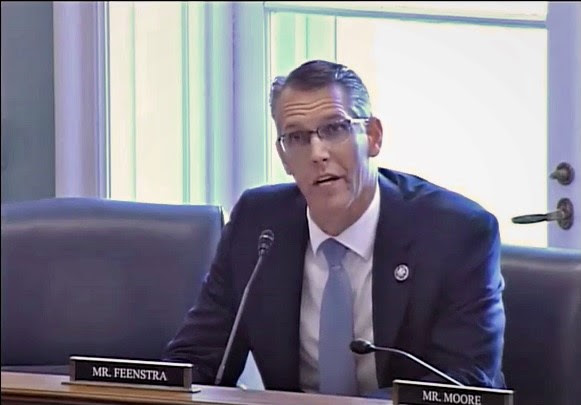Feenstra, Axne Introduce Updated Legislation to Hold Big Packers Accountable for Price-Fixing Schemes

U.S. Reps. Randy Feenstra (R-Hull) and Cindy Axne (D-West Des Moines) introduced an updated version of their Cattle Price Discovery and Transparency Act to return fairness to the cattle marketplace dominated by four major meat packers. Senators Chuck Grassley (R-IA), Deb Fischer (R-NE), Jon Tester (D-MT), and Ron Wyden (D-OR) are leading companion legislation in the U.S. Senate. The Iowa Farm Bureau and the Iowa Cattlemen’s Association are both supportive of this legislation.
Feenstra and Axne introduced the first version of the Cattle Price Discovery and Transparency Act last November. You can read more HERE.
“The Big Four Meat Packers are illegally distorting the cattle market to increase their profits at the expense of Iowa family farmers. It’s shameful and it’s wrong,” said Rep. Feenstra. “The Cattle Price Discovery and Transparency Act will finally expose the Big Packers’ price-fixing schemes and hold them accountable for their antics. I am proud to introduce this important legislation with my Iowa colleagues Senator Grassley and Rep. Axne to bring transparency to the cattle marketplace and ensure that our producers and their families are paid a fair price for their high-quality product.”
“Iowa’s independent cattle producers deserve a cattle market that provides them with fair and equal footing, and this updated legislation brings us one step closer to making that reality,” said Rep. Axne. “These critical reforms will help ensure that Iowa’s local producers can keep their doors open and participate in the market, and I will continue working with my colleagues in Congress to move these reforms forward.”
“I frequently hear from Iowa’s independent cattle producers about their struggle to get a fair price for their cattle while the nation’s four largest packers operate with record profits. I pushed for hearings in the Senate’s Agriculture and Judiciary committees to shine a light on these unfair market practices, and I’ve continued working with a bipartisan group of senators to develop a solution. Our latest proposal comes after months of working with staff at the U.S. Department of Agriculture to make technical changes that will allow them to best implement the bill. It takes several steps to improve cattle price transparency and will make much-needed market reforms to help independent producers in Iowa and across the country,” said Senator Grassley. “This bipartisan bill is the best opportunity we have to make real reform in the cattle market this year, and I’ll continue to work with my colleagues to get this across the finish line.”
“Last week’s House Agriculture Committee hearing reiterated the need for meaningful cattle market reform,” said Bob Noble, President of the Iowa Cattlemen’s Association. “The introduction of the updated Cattle Price Discovery and Transparency Act in the House is a timely and befitting response from Reps. Axne and Feenstra. We’ve asked Congress to support a transparent and competitive marketplace with action, and we thank Iowa’s congressional delegation for answering the call.”
The updated bill would:
- Require the Secretary of Agriculture to establish 5-7 regions encompassing the entire continental U.S. and then establish minimum levels of fed cattle purchases made through approved pricing mechanisms. Approved pricing mechanisms are fed cattle purchases made through negotiated cash, negotiated grid, at a stockyard and through trading systems that multiple buyers and sellers regularly can make and accept bids. These pricing mechanisms will ensure robust price discovery and are transparent.
- Establish a maximum penalty for covered packers of $90,000 for mandatory minimum violations. Covered packers are defined as those packers that during the immediately preceding five years have slaughtered five percent or more of the number of fed cattle nationally.
- Include provisions to create a publicly available library of marketing contracts, mandating boxed beef reporting to ensure transparency, expediting the reporting of cattle carcass weights, and requiring a packer to report the number of cattle scheduled to be delivered for slaughter each day for the next 14 days. The contract library would be permanently authorized and specify key details about the contents that must be included in the library – like the duration and other provisions in the contract that may impact price such as schedules, premiums, discounts, and transportation arrangements.
Last week, during a House Agriculture Committee hearing on the American cattle market, Feenstra demanded answers from the Big Packers over their anticompetitive behavior and claims that Alternative Marketing Agreements (AMAs) are the most efficient means to buy and sell cattle. In his remarks, he noted that “efficiency is not an excuse for exploitation,” amplifying small producers’ voices who deserve a fair shake in cattle sales negotiations. You can watch his full remarks below.
Earlier this year, Feenstra also spoke on the House Floor to expose what Iowa’s beef producers have known all along – that the Big Four Meat Packers are illegally distorting the market to increase their profits at the expense of Iowa family farmers.




